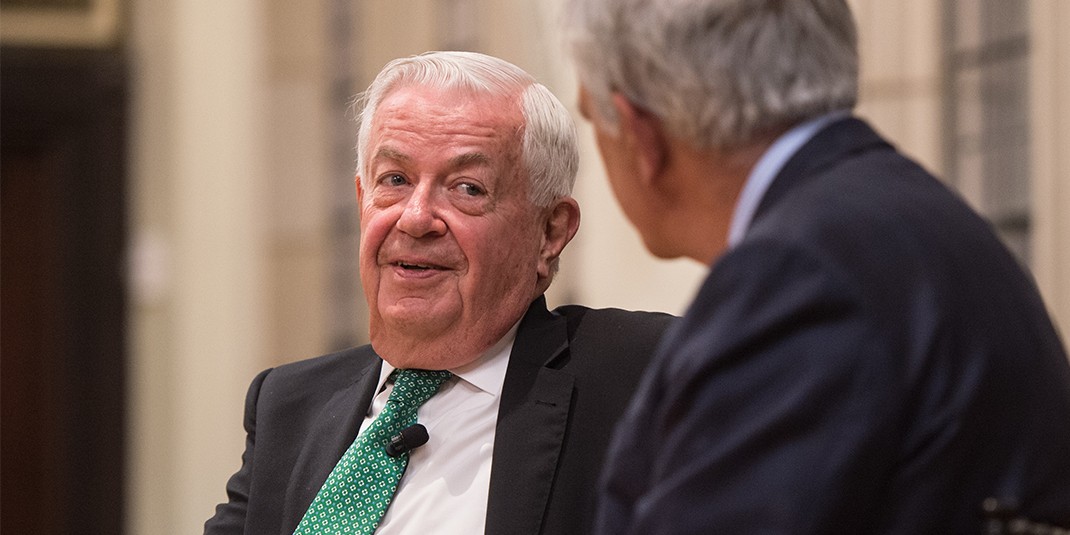HBS Examines the Allure of White-Collar Crime, and More – Boston News

Welcome back and a happy 2019!
Let’s explore some of the most interesting stories that have emerged from Boston business schools this week.
Interviewing White-Collar Criminals: 6 Tips from Harvard Business School’s Eugene Soltes – Journalist’s Resource
Denise-Marie Ordway from Journalist’s Resource recently profiled HBS professor Eugene Soltes, who’s 2016 book Why They Do It: Inside the Mind of the White-Collar Criminal surveys what “drove dozens of wealthy, successful businessmen to become white-collar criminals.”
Soltes offered six tips for journalists on how to build trust and develop rapports with potential sources behind bars.
- “Don’t lead with personal questions and questions that probe into the meatiest details of a convict’s crimes.”
- “Have a plan for whether and how you’ll use sensitive information that sources might divulge once they trust you.”
- “If you want prisoners to talk to you, write them a letter.”
- “When interviewing individuals who are incarcerated, choose phone calls over in-person meetings. You can develop a rapport more quickly through four 15-minute phone calls than one hour-long, in-person conversation.”
- “Establish a system of checking your biases to limit the impact your relationships with sources could have on your work.”
- “If you’re describing someone’s feelings, opinions or mindset, consider letting that person review what you have written to make sure it represents them accurately.”
You can read more from the Soltes profile on white collar criminals like Bernie Madoff in Journalist’s Resource.
Stocks & Bonds, Eggs & Bacon – Sawyer Business School
In early December, 2018, the first Summa Breakfast at the Sawyer Business School featured Amundi Pioneer Asset Management CIO Ken Taubes, MBA ’84, who offered his insights into “where the global economy has been and where he thinks it is going.”

A look inside the Summa Breakfast, held last month at Sawyer Business School / Photo via suffolk.edu
Taubes was surprisingly optimistic: “The dollar’s been strong, and the economy’s fine. In the macro sense for consumers, it hasn’t been this good in a long time.”
He also advises attendees to “turn off the noise and look for opportunities.”
You can read more about the recent Sawyer event here.
The Billionaire Next Door – Carroll School News
Boston College’s Joseph E. Corcoran Center for Real Estate and Urban Action recently hosted billionaire philanthropist Bill Cummings, a “model real estate developer with a strong conscience,” who spoke to roughly 70 BC community members.
After an overview of Cummings’ inspiring rags-to-riches story, along with a remarkable career ascent, he urged attendees to “do the things you want to do, and do them reasonably well.”

“An entrepreneur won’t find success by getting into a putatively lucrative industry that he’s not passionate about,” Cummings said at a recent BC event. / Photo via bc.edu
Cummings was recently honored as one of the Top 50 Givers by Forbes. The Cummings Foundation, according to the article, has “awarded more than $200 million to nonprofits in the Boston area.”
“The grants have made an impact near and far, from soup kitchens and homeless shelters in Essex, Middlesex, and Suffolk counties, all the way to Rwanda, where the foundation has established medical centers in collaboration with Boston-based nonprofit Partners in Health.”
Cummings closed with a paraphrased quote from dancer and actress Eleanor Powell:
“What we are is God’s gift to us. What we become, and what we do with our lives, is our gift to God.”
You can read more about Cummings here.
Business and Climate Change, and More – Boston News

Let’s explore some of the most interesting stories that have emerged from Boston business schools this week.
Is It Up To Business To Save the Planet? – MIT Sloan Ideas Made to Matter
The MIT Sloan Management Review recently hosted a debate between engineering professor and Center for Transportation and Logistics director Yossi Sheffi and Winston Eco-Strategies founder Andrew Winston. In which, the two discussed whether for-profit companies should have any obligations to reverse climate change.
Winston says, “There’s always been the easy wins: cutting energy, lighting, retrofits, manufacturing efficiencies, everything under ‘lean is green.’ But now you’ve got the entire clean economy, renewable energy area where it is now cheaper fundamentally to buy renewable energy than fossil fuels pretty much everywhere in the world.”
Sheffi counters that many businesses are doing the bare minimum because the cost in jobs, standard of living, and dislocation don’t “justify the means.” He argued that fast food chains, for instance, need to adopt firmer moral stances like banning burgers, but for major company’s like McDonald’s, it would be economic suicide.
You can read more from the interview here and check out the full video below.
Pushing Back on Hacks – Sawyer Business School Blog
Data breaches among American corporations (see: Equifax) have become so ubiquitous that they hardly make compelling news anymore. According to Sawyer Business School, “inadequate in-house expertise is the top reason [companies] are likely to have a data breach.”
Sawyer’s Information Systems and Operations Management (ISOM) department was developed in response to the emerging opportunities for cybersecurity professionals. ISOM Professor Benjamin Ngugi helped assemble a Cybersecurity Beanpot hackathon this past October to give students a chance to experience the challenges for themselves firsthand by earning $10,000 in scholarship money to hack a website called ShadowBank.
Ngugi says, “For students to be good, they need to really think like hackers. They need to understand some of the tools and techniques that cybercriminals use to really be good in protection. The piece that is missing is a real website that they can go and hack.”
Security Innovation CEO and President Ed Adams, whose software security company sponsored the hackathon, writes, “ShadowBank is a safe playground where people can come and practice offensive and defensive cybersecurity skills. The point is to make the site as real as possible so that people can become familiar with how to protect a site in the real world.”
With the career opportunities in cybersecurity projected to explode in the coming years, Ngugi wants every Sawyer student to have a foundation in the subject.
“Whether you’re in marketing, accounting, taxation, finance, or healthcare, you need to understand cybersecurity fundamentals, data privacy, and required compliance laws and regulations.”
You can read the full article here.
Insurers’ Nearly Invisible Negotiated Rates Can Dramatically Affect Health Care Prices – Questrom School of Business News
Questrom School of Business Professor Keith Ericson co-authored a new working paper that finds that the “rates that insurers negotiate with hospitals for specific procedures” has led to “significant variation in prices at different health care providers” for procedures like MRIs and hip replacements.
Ericson says, “[Until now] we didn’t know that there was a lot of variation between insurers’ [negotiated prices] at the same hospital. Many are concerned about hospitals being high priced versus low priced. But people should also be concerned about insurers being high-priced versus low-priced. We should think about price transparency options.”
Read the complete working paper “How Important is Price Variation Between Health Insurers?“ co-authored with Penn’s Stuart V. Craig and Northwestern’s Amanda Starc.
You can read more from the Questrom article here.
MIT Faculty Director Explains Wave of “Alt” Jobs – Boston News

Let’s explore some of the most interesting stories that have emerged from Boston business schools this week.
How Transportation Disruption and Electric Vehicles Can Slash Greenhouse Gases – Questrom School of Business Blog
BU Questrom Professor of the Practice and Director of the university Institute for Sustainable Energy (ISE)’s Peter Fox-Penner and Research Fellow Jennifer Hatch recently co-authored new research with UC Berkeley’s Will Gorman, which illuminates how the car sharing, electric car, and autonomous vehicle trends could “lead to massive reductions in greenhouse gas emissions—without overtaxing the electric utility grid.”
Hatch explains, “Transportation emissions are 26 percent of the total emissions in the United States. We need to look at realistic ways to reduce those numbers. To significantly reduce greenhouse gas emissions, we know what we need to do: electrify the transport sector and decarbonize the electricity grid.”
You can find the group’s complete study on Science Direct.
Alt-Labor, Explained – MIT Sloan Newsroom
MIT Sloan Professor and Good Companies, Good Jobs initiative Faculty Director Thomas Kochan recently unpacked what he calls the emerging “alt-labor” movement.
“Traditional forms of union representation have declined to the point where advocates inside and outside the labor movement are searching for new strategies that work with today’s economy and workforce. Most of these new forms are working outside of what is considered traditional collective bargaining.”
Kochan adds, “Management had better start to listen to the workforce. And it better recognize that if it doesn’t start to look at more sensible forms of labor law, of labor policy, then it will be in a reactive position when the public does finally stand up and say enough is enough.”
You can read more about Kochan’s work here.
Restaurateur Partners with University to Battle Food Insecurity – Sawyer Business Blog
The Suffolk University Sawyer Business School recently profiled the CARES Pantry, a new initiative developed to address food insecurity on campus and give students access to healthier lifestyles.
Gene Lee, EMBA (’96), President and Chief Executive Officer of Darden Restaurants, who funded the initiative, says, “The goal is for every student in this University to be properly nourished, in and out of class, at work, and in their everyday lives.”

Gene Lee (’96) appearing at a recent event at Suffolk University / Photo via suffolk.edu
“It’s hard enough to be a good student in a competitive environment without having to worry about your next meal. The pantry will provide students with a safety net and a place they can count on and that they deserve.”
You can read more about Lee’s appearance at his alma-mater and the CARES Pantry here.
Analyzing Credit, Bargain Hunting and Harvard, and More – Boston News

Let’s explore some of the most interesting stories that have emerged from Boston business schools this week.
What an MIT Professor Learned Analyzing 1 Million Credit Card Offers – MIT Sloan Newsroom
MIT Sloan Professor of Finance Antoinette Schoar used her appearance on Sloan’s “Data Made to Matter” podcast to discuss what analyzing one million credit card offers revealed.
“What we seemed to find in our study is that the [credit card] offers that are offered to less educated people rely in their pricing much more on these additional fees. Late fees, over limit fees, maybe default APRs that switch on once you’ve had a default,” she says on the podcast.
Schoar adds, “While people that are more educated, their cards seem to rely much more on the quite straightforward features, like they are paying an annual fee, and they’re paying an interest rate, but they are relying much less on these late fees and over limit fees.”
She also offers this takeaway for consumers:
“The more companies can model our behavioral biases, the more they can use them in extracting rents from us or catching us in moments when we’re inattentive or when we are not necessarily focused enough on choosing the right credit card, the right mortgage, or any of these products.”
You can read the full article here.
Bargain Hunters Beware: A Store’s ‘Original Price’ Might Not Be After All – Harvard Business Week
In a new working paper, Donald Ngwe, a Harvard Business School Assistant Professor, found that the “original price” many retail stores advertise in relation to an item’s hot bargain rate is often completely made up. In fact, the practice is much “more common than shoppers might realize.”
Ngwe says, “They never even tried to sell the product at that price. Consumers could never have bought that product at that price even if they tried.”
On Amazon, for instance, he notes that almost every item has a “struck-out price, but if you look at the policy behind that price, it’s incredibly vague. This makes me think that the fake prices are working to mislead the customers who know the brand the least, and who have the least information about the brand, into making a decision they would not have made otherwise.”
Ngwe’s research found that if customers “were given verifiably fake prices,” it actually does not change people’s “evaluation of quality” since we have gotten so used to the practice.
He concludes, “My results show that customers don’t see through the ruse. Even in outlet stores where they might expect some level of false discounting, they are still very influenced by these signals.”
You can read Ngwe’s paper Fake Discounts Drive Real Revenues in Retail here or the original HBW article here.
From Sheet Music to Spreadsheets – Sawyer Business School Blog
Sawyer Business School recently profiled Craig Pellet, MST ’18, a classically trained composer who ended up with a career at Boston firm Back Bay, from a Craigslist ad he answered on a whim.
Ten years after joining the firm, Pellett feels he had a number of major gaps that made it difficult to “solve client issues” so he decided to pursue Sawyer’s Master of Science in Taxation degree to “give [him] better tools to approach every problem.”

Craig Pellet, Sawyer Business School, MST ’18 / Photo via suffolk.edu
“Music teaches you how to practice, be committed, and be focused. It puts you in the mind-set: I want to get good at this, but it’s going to take me 10 years. So it’s time to start chipping away at it,” Pellett tells the Sawyer blog.
Pellett ended up working with his tax policy instructor Professor Michaele Morrow on a research paper that explored the notion of eliminating S-corporations to make taxation more fair. Morrow described Pellett’s notion as “pretty radical.”
“I somewhat believed him but wanted to really see. So I asked him to run the numbers. Turns out, he was right.”
Their paper was recently published in trade publication Tax Notes.
You can read the full interview with Pellett here.
The Case for Business Curiosity from Harvard, and More – Boston News

Let’s explore some of the most interesting stories that have emerged from Boston business schools this week.
The Business Case for Curiosity – Harvard Business Review
Harvard Business School Professor of Business Administration and Behavioral Scientist Francesca Gino recently published an article in the Harvard Business Review in which she elaborated on the “benefits of and common barriers to curiosity in the workplace.”
Professor Gino points to research, which offers “three important insights about curiosity as it relates to business”
- Curiosity is essential to the performance of an enterprise, leading to “fewer decision-making errors, more innovation, reduced group conflict, and more-open communication and better team performance.”
- By “making small changes” to organization and management, leaders can do more to encourage their employees’ curiosity
- Leaders fear curiosity “will increase risk and inefficiency.”
To address these three insights, Professor Gino offered “five strategies that can help leaders get high returns on investments in employees’ curiosity and in their own”:
- Hire for curiosity.
- Model inquisitiveness.
- Emphasize learning goals.
- Let employees explore and broaden their interests.
- Have “Why?” “What if…?” and “How might we…?” days.
She concludes, “Maintaining a sense of wonder is crucial to creativity and innovation. The most effective leaders look for ways to nurture their employees’ curiosity to fuel learning and discovery.”
You can read more about the business curiosity research here.
Occasional Breaks Can Make Groups Smarter – Questrom School of Business News
BU Questrom’s Jesse Shore recently co-authored new PNAS research, which finds that scientists who integrate “short breaks into problem-solving sessions improves both the average performance of the group and increases the likelihood of getting the best solution.”
The study, which was co-authored by Harvard’s Ethan Bernstein and David Lazer, has “implications for the way we use always-on collaboration software, such as Slack and Google Docs.”
Shore explains, “In many of these [collaborative software tools], the goal seems to be to keep people constantly aware of what others are doing. But the reality is that if you’re getting an alert every time something happens and you’re not taking the time to work separately and have your own independent thoughts, it may hurt the group’s overall ability to solve complex problems.”
You can find the full article here.
Sound Advice: Marketing Students Help Sonos Better Understand Its Customers – Suffolk Experience
The Suffolk Experience recently highlighted Sawyer Business School marketing research collaboration with Sonos, a “go-to source for high-quality home sound systems” that just so happens to be within walking distance of campus.
To accommodate the prediction that over “50 percent of all searches worldwide will be done by voice within four years,” Sonos had thrown its hat in the voice-assistance ring with Apple’s HomePad, Amazon Echo, and Google Home. The company reached out to Sawyer to better understand how late millennial 18-to-24-year-old consumers interact with voice-assistant speakers.
Sonos Consumer Insights Manager Dennis Brosnan writes, “Sonos likes working with Sawyer Business School students because the analysis and recommendations they present are often different than the approach we would take.”
You can read more about the Sonos research here.
Cryptocurrency Volatility, a Vacation App, and More – Boston News

Let’s explore some of the most interesting stories that have emerged from Boston business schools this week.
Digital Tulips: High Risks, High Rewards in ICOs – Carroll School News
Boston University Carroll School of Management Assistant Professor of Finance Leonard Kostovetsky and Ph.D. candidate Hugo Benedetti (’19) recently co-authored a draft paper that explores how the high returns associated with Bitcoin, for instance, are in part a byproduct of the uncertainty that surrounds cryptocurrency. But as crypto becomes clearer, the researchers note that “that effect might be declining.”
The Social Science Research Network published the duo’s paper, entitled “Digital Tulips? Returns to Investors in Initial Coin Offerings,” which finds that “startups set a low, low price at the initial coin offering (ICO) stage to compensate for the volatility. In effect, it’s an uncertainty discount that keeps the price down, which drives up the returns.”
You can check out the full article on the official BC website.
People Aren’t Using Their Vacation Time. These Alumni Want to Fix That – D’Amore-McKim News
Treehoppr, “an online platform that tracks accrued time off,” was founded by Northeastern University D’Amore-McKim grads Kevin Corliss, DMSB (’16), Douglas Franklin, DMSB/E (’16), and Christopher Kenyon, CCIS (’17), in response to the “uniquely American” reality of how few working professionals take advantage of “paid time off.”

Treehoppr, an app created by a trio of D’Amore-McKim alumni, hopes to solve the uniquely American issue of not taking time off of work.
In an interview with their alma mater, Corliss says, “We want to help people eliminate these barriers to travel. What are the things you always hear when you ask people about traveling? They don’t have the time, the money, or the know-how when it comes to a foreign country. We want to help people solve all those issues.”
Dive into the trio’s story here.
The Gourmet MBA – Suffolk Experience
Suffolk University recently published a profile on current Sawyer Business School MBA Danielle Health (’19), whose @BostonBehavior Instagram profile demonstrates her knack for monetizing that very 21st century ritual of the meal snapshot—one she’s parlayed into a full-time job at social media management company Metter Media.
Health explains that she generally approaches the manager of “each restaurant she wants to visit as a one-time business partner.” She explains that her Instagram affords restaurants quite “a lot of visibility for a pretty minimal investment.”
She continues:
“Bigger food bloggers might have 100,000 followers. But that doesn’t matter if the people aren’t in Boston. About 90 percent of my followers are local to the Boston area, and most are my age. So I can deliver a really targeted and high-value group to a restaurant that I put on my feed.”
Check out the full profile here.
